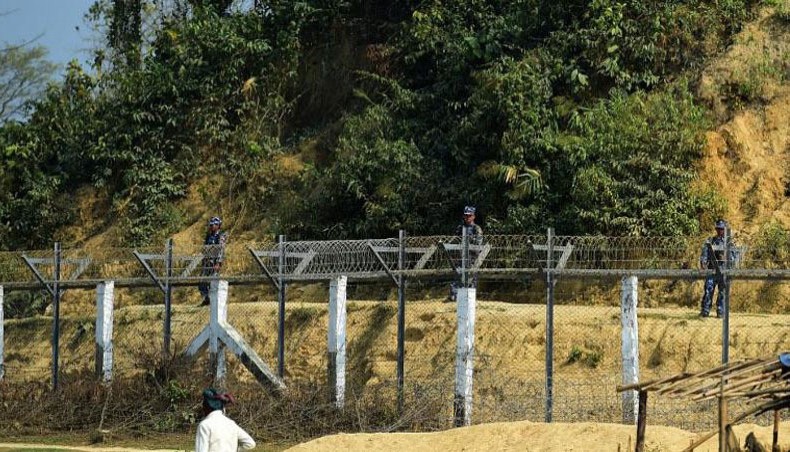
Foreign affairs and security experts, including former diplomats, have said that Bangladesh should mobilise international pressure on neighbouring Myanmar for the return of Rohingya and take all possible measures to secure its border to check any spillover effects of their internal conflict on its territory.
They said that the developing situation in Myanmar could plunge the Rohingya repatriation into further uncertainties and destabilise the whole region.
They said that Bangladesh should engage more with Myanmar for a better understanding of the evolving situation in the Southeast Asian nation due to armed conflicts between the junta regime and opposing forces joined by ethnic groups for the last three years, after the military coup in particular.
‘We need to engage with Myanmar for a better understanding of their internal dynamics and in which directions they are evolving,’ said retired diplomat M Humayun Kabir on Thursday, adding that it would create military and other problems in the region if Myanmar failed as a state for any reason.
He said that such armed conflicts inside a neighbouring country involved risk factors for Bangladesh and others in the region, as the Myanmar regime was not only fighting ethnic groups but also the anti-junta forces.
‘Bangladesh will have to move more cautiously and keep itself engaged in two layers—one with stakeholders like China, India, and other international communities and with Myanmar in the other layer,’ Humayun, also president of the Bangladesh Enterprise Institute, told New Age.
The Bangladesh Institute of Peace and Security Studies president, retired major general ANM Muniruzzaman, said that Myanmar’s internal conflict might spill over and Bangladesh’s diplomacy should be more dynamic and agile to keep pace with the situation.
‘The risk factors for Bangladesh are extremely high and complex. There is a possibility that the conflict in Myanmar might spill over,’ he said, adding that Bangladesh should do everything to secure its border with Myanmar as there are ethnic affinities between the people on both sides of the border.
Dhaka University international relations professor Amena Mohsin said that the conflict in Myanmar would further delay the repatriation of Rohingyas.
‘We have to be more particular in this regard and ensure our border is secure,’ she said, adding that the international community also has some responsibilities there.
Regarding Rohingya repatriation, former foreign secretary Md Touhid Hossain observed that things were not changing inside Myanmar and that they were not taking back any Rohingya from Bangladesh, now hosting more than 11 lakh displaced Myanmar nationals after the 2017 exodus when more than seven lakh persecuted people fled to Cox’s Bazar from Rakhine state.
Asked about the risk of armed conflicts in the bordering country, the retired diplomat said that the Myanmar military regime would sit at a table with fighting forces like the Arakan Army and NUG (the National Unity Government of Myanmar formed in exile) as the situation developed.
He suggested that Bangladesh should begin ‘unofficial talks’ with non-state actors so that it could take advantage after the end of the civil war in Myanmar.
DU international relations professor Imtiaz Ahmed said that Myanmar used to exploit instability for its own benefit, and therefore Bangladesh needs to remain more alert to the present situation there.
He underlined the need for mobilising international pressure on Naypyidaw and to negotiate with China, India, and Japan so that they exert pressure to resolve the Rohingya crisis, as China was already engaged in the process.
Asked for comment, foreign ministry spokesperson Seheli Sabrin said Bangladesh was in communication with the Myanmar government as well as its missions in the country. ‘We have taken all measures to make sure our border with the country is secure and no new intrusion takes place in the present situation,’ she told a weekly briefing at the ministry on Thursday.
Panic gripped the people living in the remote villages of Naikhyangchari under Bandarban district amid continued heavy firing and mortar shelling across the border in Myanmar.
Local people said that they had heard the sound of sporadic gunshots and mortar shelling between the evening and midnight on Tuesday and spotted two artillery shells the following morning along the border.
Myanmar’s junta on Wednesday extended a state of emergency by six months, again delaying elections the military has promised to hold as it battles opposition across the country, Agence France-Presse reported from Yangon.
The Southeast Asian nation has been in turmoil since the February 2021 coup, which ended a ten-year experiment with democracy and sparked mass protests and a crackdown on dissent, said the report on Wednesday.
Three years on, the junta is struggling to crush widespread armed opposition to its rule and has recently suffered a series of stunning setbacks from an alliance of ethnic minority armed groups.
The military declared a state of emergency when it ousted Aung San Suu Kyi’s government in February 2021, citing unsubstantiated allegations of electoral fraud in the 2020 elections her party won in a landslide.
The Arakan Army, Myanmar National Democratic Alliance Army, and Ta’ang National Liberation Army seized roads to the country’s biggest trading partner, China, and captured dozens of military outposts, the AFP report mentioned.
New Age

